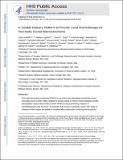A tunable delivery platform to provide local chemotherapy for pancreatic ductal adenocarcinoma
Author(s)
Ligorio, Matteo; Ting, David T.; Xega, Kristina; Tzafriri, Abraham R.; Bersani, Francesca; Aceto, Nicola; Thapar, Vishal; Fuchs, Bryan C.; Deshpande, Vikram; Baker, Aaron B.; Ferrone, Cristina R.; Haber, Daniel A.; Clark, Jeffrey W.; Edelman, Elazer R.; Indolfi, Laura; Langer, Robert S; ... Show more Show less
DownloadEdelman_A tunable delivery.pdf (613.0Kb)
PUBLISHER_CC
Publisher with Creative Commons License
Creative Commons Attribution
Terms of use
Metadata
Show full item recordAbstract
Pancreatic ductal adenocarcinoma (PDAC) is one of the most devastating and painful cancers. It is often highly resistant to therapy owing to inherent chemoresistance and the desmoplastic response that creates a barrier of fibrous tissue preventing transport of chemotherapeutics into the tumor. The growth of the tumor in pancreatic cancer often leads to invasion of other organs and partial or complete biliary obstruction, inducing intense pain for patients and necessitating tumor resection or repeated stenting. Here, we have developed a delivery device to provide enhanced palliative therapy for pancreatic cancer patients by providing high concentrations of chemotherapeutic compounds locally at the tumor site. This treatment could reduce the need for repeated procedures in advanced PDAC patients to debulk the tumor mass or stent the obstructed bile duct. To facilitate clinical translation, we created the device out of currently approved materials and drugs. We engineered an implantable poly(lactic-co-glycolic)-based biodegradable device that is able to linearly release high doses of chemotherapeutic drugs for up to 60 days. We created five patient-derived PDAC cell lines and tested their sensitivity to approved chemotherapeutic compounds. These in vitro experiments showed that paclitaxel was the most effective single agent across all cell lines. We compared the efficacy of systemic and local paclitaxel therapy on the patient-derived cell lines in an orthotopic xenograft model in mice (PDX). In this model, we found up to a 12-fold increase in suppression of tumor growth by local therapy in comparison to systemic administration and reduce retention into off-target organs. Herein, we highlight the efficacy of a local therapeutic approach to overcome PDAC chemoresistance and reduce the need for repeated interventions and biliary obstruction by preventing local tumor growth. Our results underscore the urgent need for an implantable drug-eluting platform to deliver cytotoxic agents directly within the tumor mass as a novel therapeutic strategy for patients with pancreatic cancer. Keywords: Pancreatic cancer; Chemoresistance; Local delivery; Patient-derived xenograft; Paclitaxel; Poly(lactic-co-glycolic acid)
Date issued
2016-03Department
Massachusetts Institute of Technology. Institute for Medical Engineering & Science; Koch Institute for Integrative Cancer Research at MITJournal
Biomaterials
Publisher
Elsevier
Citation
Indolfi, Laura et al. “A Tunable Delivery Platform to Provide Local Chemotherapy for Pancreatic Ductal Adenocarcinoma.” Biomaterials 93 (July 2016): 71–82 © 2016 Elsevier Ltd
Version: Author's final manuscript
ISSN
0142-9612
1878-5905